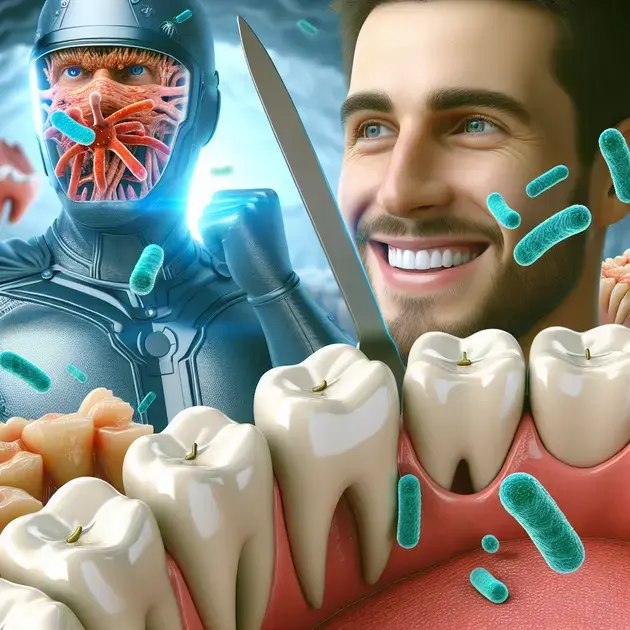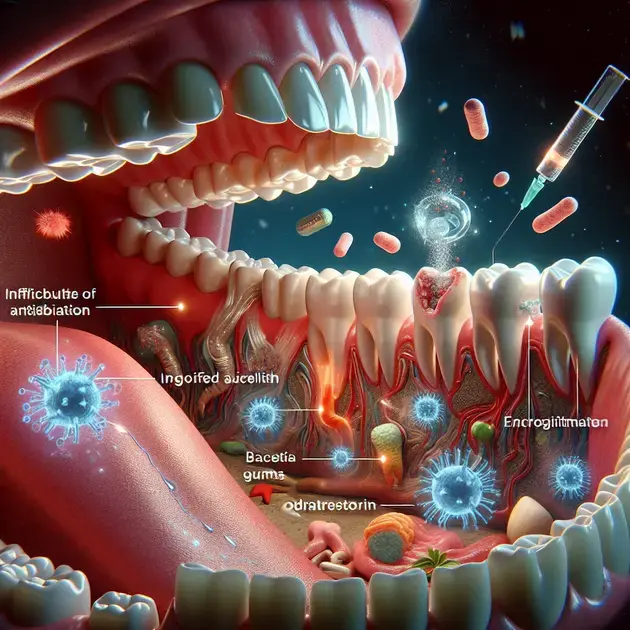Effective medication for periodontitis is crucial for managing this serious gum infection. With the advancements in dental research and technology, there are now a variety of treatment options available to effectively combat periodontitis and improve oral health.
This comprehensive guide will explore the most up-to-date and effective medication for periodontitis, shedding light on the different types of treatment, their benefits, and what patients can expect during the treatment process. Stay informed and empowered in your journey to healthier gums!

Effective Periodontitis Medication Options
Periodontitis, a severe form of gum disease, requires effective medication options to control and treat the condition. One such option is prescription antibiotics, such as doxycycline or minocycline, which can help to reduce bacteria and inflammation in the gums. These antibiotics are often prescribed in pill form and may be complemented with a topical antibiotic gel for targeted treatment. Patients can consult with their dentists or periodontists to explore these medication options and determine the most suitable course of treatment.
Another medication option for periodontitis is antimicrobial mouth rinses, which can help to reduce plaque and gingivitis that contribute to gum disease. Popular brands like Listerine or Colgate offer antimicrobial mouth rinses that are easily accessible at local pharmacies or online stores. Incorporating regular use of these mouth rinses into a daily oral hygiene routine can aid in managing periodontitis and promoting healthier gums.
For more advanced cases of periodontitis, a dentist may recommend prescription-strength fluoride toothpaste to help strengthen tooth enamel and prevent further decay. These specialized toothpaste products, such as PreviDent 5000 or Clinpro 5000, contain higher concentrations of fluoride than over-the-counter options and can be obtained through a dental office or online dental supply stores. Following the dentist’s instructions for proper use of prescription-strength fluoride toothpaste is essential for maximizing its benefits in combating periodontitis.
In addition to medication options, patients with periodontitis can explore complementary treatments such as herbal mouthwashes or essential oils known for their antibacterial properties. Websites like Healthline or WebMD offer comprehensive information on natural remedies for gum disease, including recipes for homemade mouthwashes using ingredients like tea tree oil or peppermint extract. By incorporating these natural alternatives alongside conventional medication, patients can enhance their periodontal care and promote overall gum health.
Understanding Treatment Benefits
Understanding the benefits of periodontitis treatment is crucial for patients to actively participate in their oral health journey. One key benefit is the prevention of tooth loss, as untreated gum disease can lead to the deterioration of the supporting structures of the teeth, ultimately resulting in tooth loss. By following prescribed treatment plans and maintaining good oral hygiene practices, patients can prevent the progression of periodontitis and preserve their natural teeth.
Another significant benefit of periodontitis treatment is the improvement of overall oral health and systemic well-being. Studies have shown a strong link between gum disease and various systemic conditions, such as heart disease and diabetes. By effectively managing periodontitis through medication and professional dental care, patients can reduce their risk of developing complications associated with gum disease and improve their overall quality of life.
Furthermore, successful treatment of periodontitis can lead to enhanced aesthetics and self-confidence for patients. As gum disease often causes gum inflammation, recession, and bad breath, addressing these symptoms through comprehensive treatment can result in a healthier and more attractive smile. Patients who commit to their periodontal treatment can enjoy the aesthetic benefits of healthy gums and teeth, boosting their self-esteem and overall well-being.
Understanding the benefits of periodontitis treatment empowers patients to make informed decisions about their oral health and collaborate effectively with their dental providers. By recognizing the positive outcomes of treatment, patients are motivated to prioritize their oral hygiene and follow through with recommended medication options and procedures, leading to long-term gum health and overall wellness.
Empowering Patients on the Journey to Healthier Gums
Empowering patients to take charge of their gum health is essential in the management of periodontitis and prevention of complications. One effective way to empower patients is through education and awareness about the causes and consequences of gum disease. Websites like the American Dental Association (ADA) or the Centers for Disease Control and Prevention (CDC) provide valuable resources on gum disease prevention and treatment, helping patients understand the importance of proactive oral care.
Another empowering step for patients is to engage in regular dental visits and consultations with oral health professionals. Dentists and periodontists play a critical role in assessing gum health, diagnosing periodontitis, and recommending appropriate treatment options. By actively participating in dental appointments and seeking professional guidance, patients can stay informed about their oral health status and receive personalized care to address their specific needs.
Self-monitoring practices, such as regular brushing, flossing, and monitoring gum health changes, empower patients to be proactive in maintaining healthy gums. Mobile applications like Oral-B or Colgate provide interactive tools and reminders for effective oral hygiene routines, encouraging patients to establish and follow a consistent regimen for gum disease prevention. By incorporating these digital resources into their daily oral care practices, patients can take ownership of their gum health and track their progress towards healthier gums.
Additionally, fostering a supportive network of family members, friends, or online communities can empower patients to stay motivated and accountable in their journey to healthier gums. Social platforms like Facebook groups or Reddit forums dedicated to oral health offer platforms for sharing experiences, seeking advice, and celebrating achievements in gum disease management. By connecting with others and sharing knowledge and encouragement, patients can feel supported and empowered to stay committed to their gum health goals.

**Treating Periodontitis with Antibiotics**
Introduction
Periodontitis is a severe gum infection that can damage the soft tissue and destroy the bone that supports your teeth. Antibiotics are commonly used in the treatment of periodontitis to control the bacterial infection and reduce inflammation.
When prescribed by a dentist or periodontist, antibiotics can be an effective tool in treating periodontitis, especially when used in conjunction with other dental treatments, such as scaling and root planing.
It’s essential to understand the role of antibiotics in the treatment of periodontitis and how they can help restore gum health and prevent further damage to the teeth and supporting structures.
Benefits of Antibiotics in Periodontitis Treatment
Antibiotics are effective in treating periodontitis because they can reach bacteria that may be deep within the gum pockets, where scaling and root planing alone may not be able to reach.
By targeting the bacteria causing the infection, antibiotics can help reduce inflammation, promote healing, and prevent the progression of periodontitis.
Some antibiotics, such as doxycycline or tetracycline, have been specifically formulated to target the bacteria associated with periodontitis, making them an essential part of the treatment plan.
When used correctly and in combination with professional dental care, antibiotics can improve the effectiveness of periodontitis treatment and help patients achieve better oral health outcomes.
While antibiotics can be beneficial in treating periodontitis, it’s essential to use them only as prescribed by a dental professional to avoid side effects and antibiotic resistance.
Side Effects and Considerations
Like any medication, antibiotics used to treat periodontitis can have side effects, including nausea, diarrhea, and yeast infections in some cases.
It’s crucial for patients to inform their healthcare provider of any allergies or sensitivities they may have to antibiotics to avoid adverse reactions.
Antibiotic resistance is also a significant concern in the treatment of periodontitis, so it’s essential to follow the prescribed dosage and duration to minimize the risk of developing antibiotic-resistant bacteria.
Regular follow-up appointments with your dentist are necessary when taking antibiotics to monitor your progress and ensure the effectiveness of the treatment.
If you experience any concerning side effects while taking antibiotics for periodontitis, be sure to contact your dental provider immediately for further guidance.
**
Conclusion
**
In conclusion, antibiotics play a crucial role in the treatment of periodontitis by effectively targeting deep-seated bacteria within the gum pockets, where traditional methods may fall short. By combating the root cause of the infection, antibiotics aid in reducing inflammation, facilitating healing, and halting the progression of periodontitis. Specifically formulated antibiotics like doxycycline and tetracycline are instrumental in addressing the bacteria associated with this condition, enhancing the overall treatment plan’s efficacy.
When utilized in conjunction with professional dental care, antibiotics synergize with treatments such as scaling and root planing to elevate the outcomes of periodontitis management, leading to improved oral health for patients. However, it is imperative to strictly adhere to the prescribed dosage and duration under the guidance of a dental professional to mitigate potential side effects and the development of antibiotic resistance.
Moreover, patients must remain vigilant about possible adverse reactions, including nausea, diarrhea, and yeast infections, and communicate any allergies or sensitivities to their healthcare provider promptly. As antibiotic resistance poses a significant challenge in periodontitis treatment, maintaining regular follow-up appointments with the dentist is essential for monitoring progress and ensuring the treatment’s efficiency. Should any concerning side effects arise during antibiotic therapy for periodontitis, swift communication with the dental provider is crucial for appropriate guidance and intervention.



